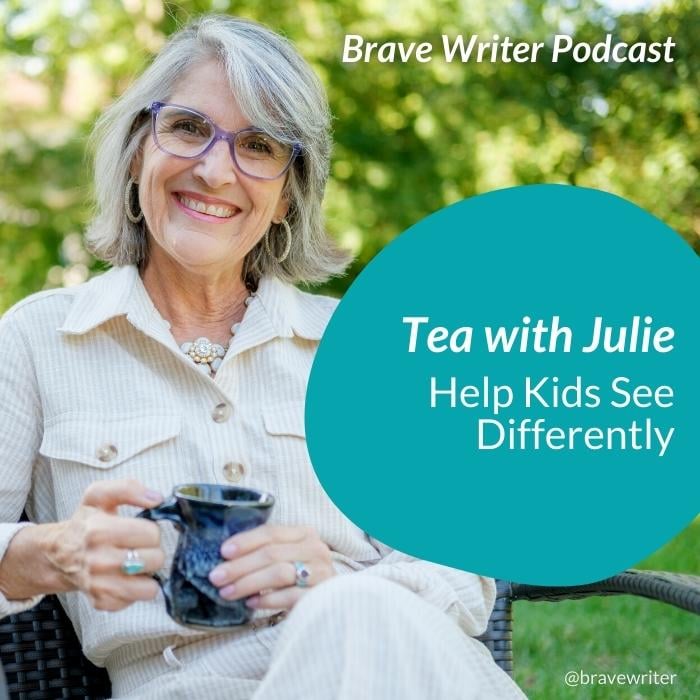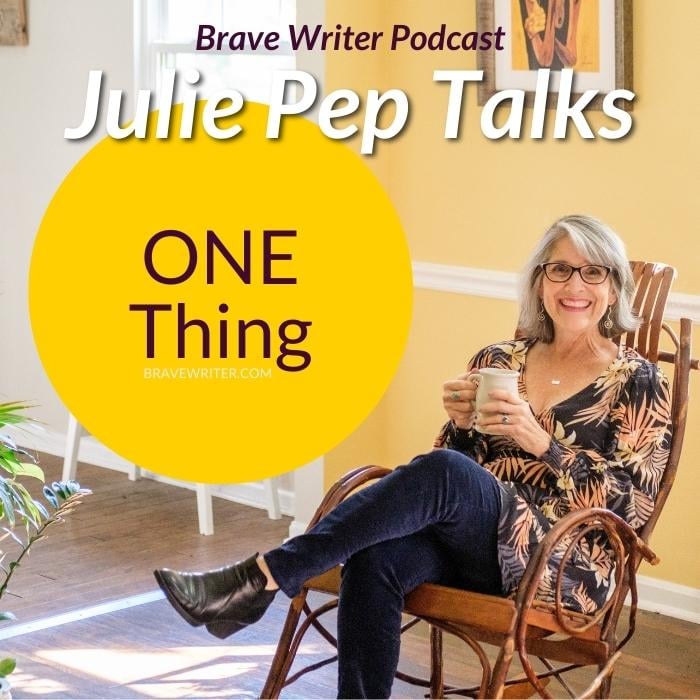
Remember the last competitive game you played with family or friends. Did you win or lose? Describe how that happened and how everyone reacted.
New to freewriting? Check out our online guide.

Remember the last competitive game you played with family or friends. Did you win or lose? Describe how that happened and how everyone reacted.
New to freewriting? Check out our online guide.
Tags: Writing prompts
Posted in Friday Freewrite | Comments Off on Friday Freewrite: Win or Lose?

I am recording some of my Tea with Julie emails for the podcast for those of you who prefer to listen. These are brief messages of support for parents and educators. If you’d like to receive the weekly emails, they are free. Sign up at bravewriter.com/tea
How did it go thinking about surprise as a force for good?
In our Brave Writer podcast series on the Four Forces of Enchantment, it’s time to look at the second force, which is MYSTERY.
Let’s explore:
Complete Tea with Julie notes can be found HERE.
Resources
Connect with Julie
Tags: Forces of Enchantment, Tea with Julie Podcasts
Posted in Podcasts | Comments Off on Podcast: Help Kids See Differently

Want to clarify your bias? Ask: what do I hope will be true?
It’s easy to identify bias in everyone else: that news show anchor, the brash radio host, your annoying neighbor, the uncle who won’t shut up at the holiday dinner…
Bias lives in all of us, however—even those of us who pride ourselves on being “objective.” What’s harder to detect is the invisible, silent influence bias has on how we think. The method for detecting bias isn’t more studying (you can always find books and articles to confirm your biases). Rather, bias is merely how your mind sorts information to affirm what you hope will be true.
When you read about homeschooling, don’t you begin hoping that whatever you read will validate that homeschooling is a trustworthy method of education? That “hope” is where your mind starts when it goes to read the article. If you read an article that’s against homeschooling, don’t you find yourself wanting to discredit what you read? You want homeschooling to be seen as effective so you hope that this negative article isn’t accurate or true.
Try this.
You aren’t asking what IS true. You aren’t asking if the writers are biased. You aren’t even trying to see if you agree or disagree with the writer.
Your task is to detect the little internal voice that is already telling you whether or not to trust this article, and what you hope to find (you may even hope to find that the writer is a loudmouth or that the information is wrong or that the research is flawed). If it’s a headline you like, you may hope to find more data to confirm what you want to be true!
Bias is the unconscious posture you take toward any information. It’s not possible to eliminate it. The best we can do is notice it—bring it to the surface so it can ride sidecar while you read an article, tweet or Instagram caption. It’s also helpful to notice your bias when in conversation.
Ask: what do I hope she’ll say? What do I wish he wouldn’t say?
The crux of bias is: What do I hope will be true?
This post is originally from Instagram and @juliebravewriter is my account there so come follow along for more conversations like this one!
Posted in Raising Critical Thinkers | Comments Off on What Do I Hope Will Be True?

If you were made into an action figure, what accessories would you have? What would be in your expansion pack? Why?
New to freewriting? Check out our online guide.
Tags: Writing prompts
Posted in Friday Freewrite | Comments Off on Friday Freewrite: Action Figure

Let me know if this sounds familiar:
You’re trying to think about all of the things you need to accomplish, not just in a day, but over the course of your child’s life—from birth to adulthood? Eating, walking, reading, writing, riding a bike, instilling good morals… the list goes on! And homeschooling only adds more of that responsibility onto your plate. It can be so overwhelming.
So how do we plan a life that accounts for each child’s personal needs and gets them to the finish line of adulthood well-educated, behaved, kind, and ready to live life on their own?
We do it one thing at a time.
Research shows that multitasking, that thing so many of us love to do—it feels so efficient!—is actually a myth. It isn’t real. What we’re really doing while multitasking is rapidly switching between two tasks, not doing two things at once. The worst part is that each time we switch, we’re losing efficiency and focus. We’re doing two things poorly.
When you want to have success in parenting or homeschooling, you need your deep, attentive focus state.
We want our material to do the instructing for us, and we are just there for supervision. This is called “open and go” curriculum. The problem is that, just like a car, if you’re not paying attention to where you’re steering, you’re going to crash. If you’re not present to the content, you can’t guarantee that your child is going to end up at the right destination. So what do you do? You use The One Thing Principle.
The One Thing Principle says this: Use the deep attention focus state to accomplish your most important goals in parenting and educating.
Remember: we are home educators. We are not recreating school. One of the biggest advantages to being at home is the ability to go in-depth when studying or pursuing an interest. With this principle, we can do so guilt-free.

Posted in Podcasts | Comments Off on Podcast: One Thing

I’m a homeschooling alum -17 years, five kids. Now I run Brave Writer, the online writing and language arts program for families. More >>
IMPORTANT: Please read our Privacy Policy.















